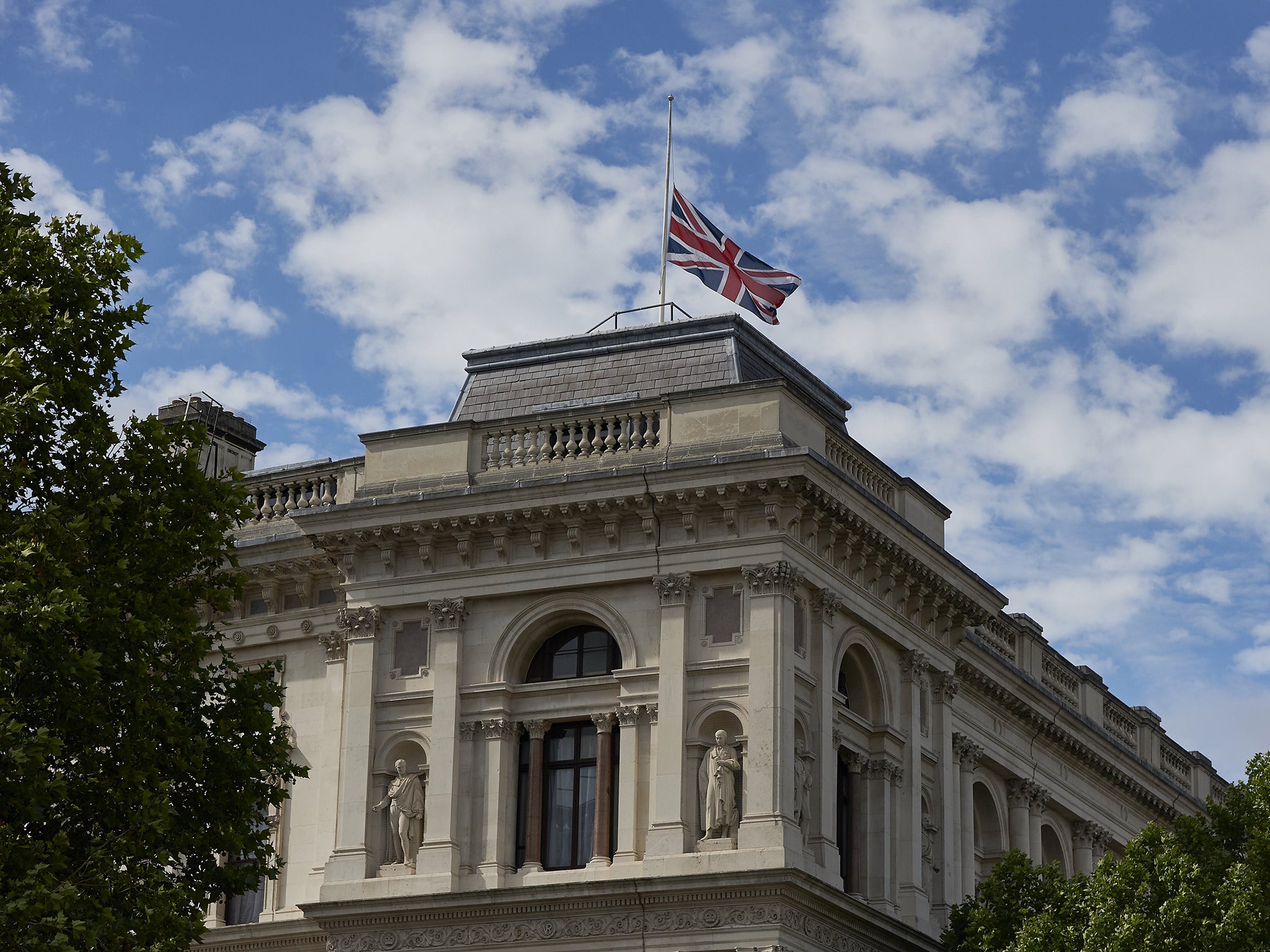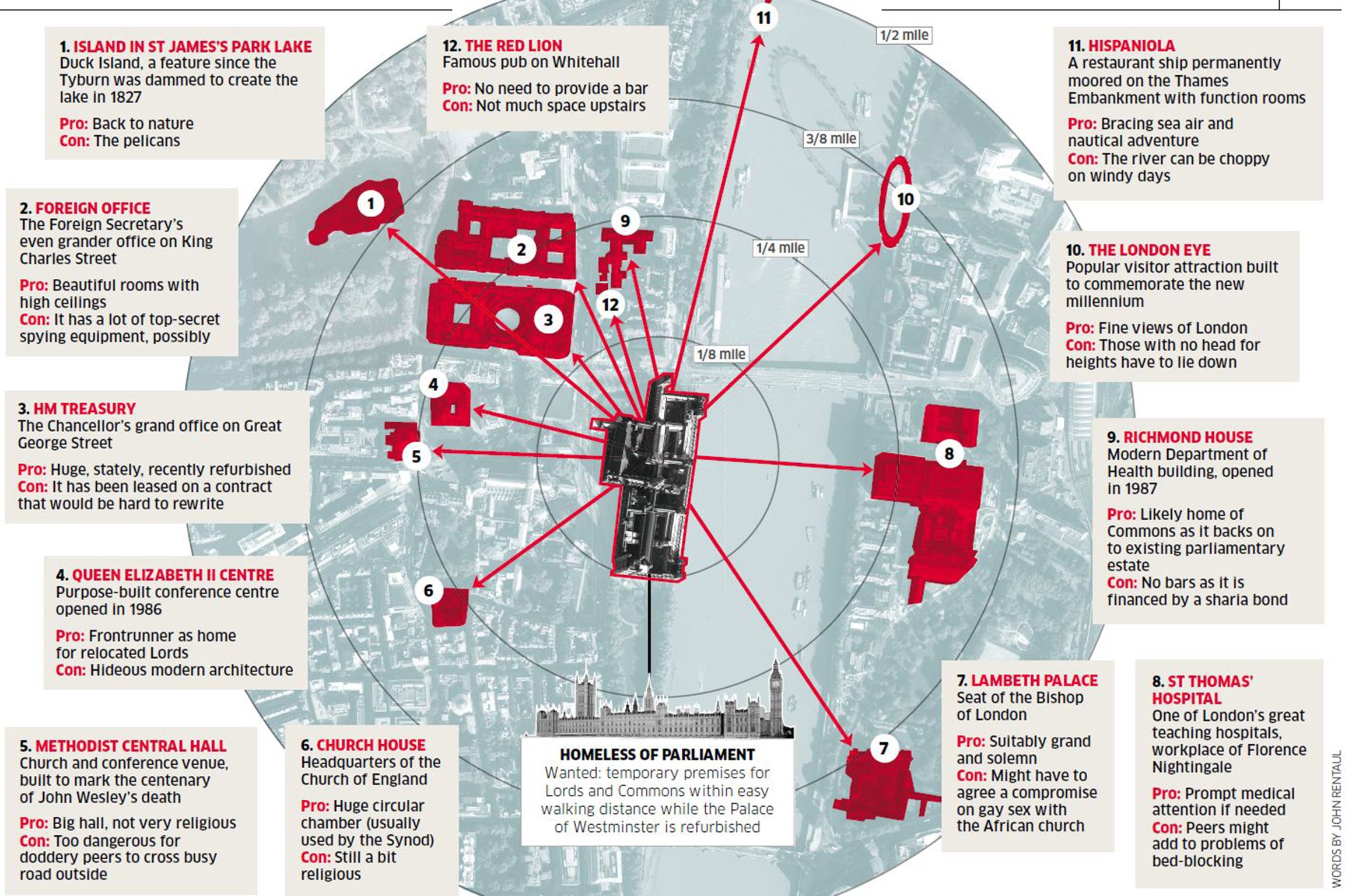Peers blocked from moving to Foreign Office as part of Parliament refurbishment because of bugging equipment
Exclusive: Working out how to refurbish Parliament while governing the country is proving a real headache

Peers have been blocked from moving to the Foreign Office as part of the £7bn refurbishment of Parliament because of bugging equipment, The Independent on Sunday can reveal.
Some MPs also want to nationalise one of the country’s most famous pubs, The Red Lion on Whitehall, to have a drink to help them through overly long debates when the Commons debating chamber is moved as part of the revamp.
Repair work needs to start in 2020 to save the Palace of Westminster, which is riddled with rodents, moths and asbestos, but this is likely to involve moving both Houses of Parliament.
One option is to move the House of Lords chamber, or at least peers’ offices, to the Foreign & Commonwealth Office (FCO), near Charing Cross station, but officials have pointed out that this would involve the complicated removal of surveillance kit that is in place for national security. FCO officials are understood to have suggested that the Lords should instead take space in the Treasury, which is closer to Parliament, but this is horribly complicated.

The Treasury underwent a £100m private finance initiative revamp during Tony Blair’s premiership. The legal terms of these contracts are fiendishly difficult to unravel, meaning that any changes to the building’s use would be all but impossible.
The chaos means that peers are likely to end up voting and making speeches in the QEII Centre, which neighbours Parliament and was taken off the “for sale” list by the coalition in case it was needed when Westminster was, in effect, rebuilt.
A source on the restoration and renewal committee, a cross-bench panel considering the future of the 19th-century palace, said: “The impression we’re getting from the Foreign Office and the Treasury is that they aren’t exactly falling over themselves to host members of the House of Lords. Even if the Lords does go to the QEII there [are] going to have to be overspill offices, so we’re going to need one of them.”
A second committee source added: “[The FCO is] trying to tell us that they’ve installed some multimillion-pound equipment that they don’t want to move. The Treasury, because it is a PFI, is incredibly difficult to carry out any changes to the building.”
MPs are almost certain to end up with a temporary chamber in Richmond House or one of its courtyards, because it is next door to MPs’ offices opposite the palace. Richmond House has housed the Department of Health since the 1980s, but, since the lease was transferred to a sharia bond scheme two years ago, alcohol has been banned from the building, annoying MPs who rely on venues such as Strangers’ Bar, alongside a terrace overlooking the Thames, to help them get through late votes.
The committee is also understood to be considering a plea from some MPs to compulsorily purchase The Red Lion, a hostelry famous for entertaining political fixers, journalists and the players themselves. Owned by the Fuller’s Brewery, The Red Lion made headlines when Gordon Brown was chancellor, because his spin-doctor, Charlie Whelan, was revealed to have told journalists, erroneously, that Britain was about to join the euro.
Parliament’s revamp is considered vital if it is to continue as a working office. Rebuilt after a huge fire in 1834, it is no longer fit for purpose and recent intakes of MPs, particularly, complain about its patchy Wi-Fi.
Many MPs would like Parliament to move to another part of the country to help move Britain’s economic and democratic dependence away from London, but this is considered impractical given that the machinery of government is in the capital.
Politicians have been asked to consider whether to let repair work take place around them or to decant MPs and Lords one chamber at a time, but the quickest, cheapest and most likely option is to move all of them out for at least six years.
Join our commenting forum
Join thought-provoking conversations, follow other Independent readers and see their replies
Comments
Bookmark popover
Removed from bookmarks